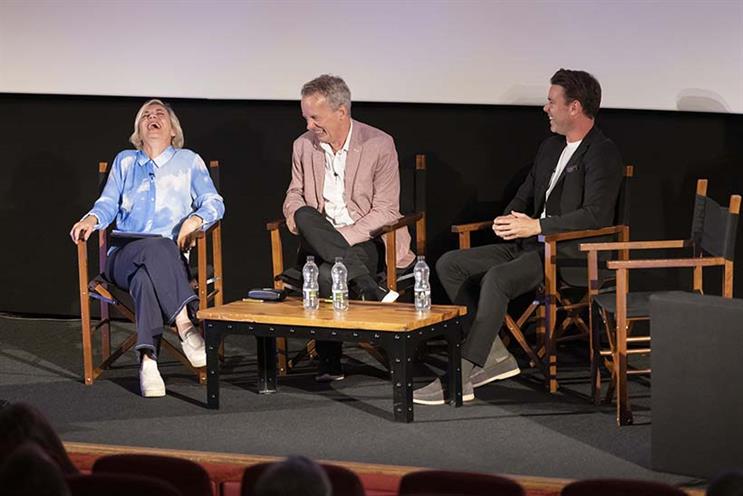
Positive emotions are the key to unlocking both long- and short-term results in audio advertising. This was the headline finding from new research unveiled by Radiocentre and System 1 at Tuning In.
With KISS’s Tyler West hosting, the conference also heard about why radio broadcasters are a natural fit for podcasts, the need to find humanity behind today’s, often challenging, news headlines – and more.
Stronger than ever
Radiocentre CEO Matt Payton opened the conference with the news that in its 50th year, commercial radio has never been stronger. Between 2019 and 2022, commercial radio revenues in the UK have increased from £693 million to a new high of £740 million. Digital-audio advertising also hit a new record high last year of £186 million. Radio still represents by far the biggest proportion of commercial audio hours against which you can buy advertising, at 84% according to Rajar Midas.
Introducing the new publication Listen Up! from System1 and Radiocentre on audio creative effectiveness, Donna Burns, Radiocentre’s head of insight, said: “This research presents a huge opportunity for brands to harness the power of sound. It will help them to make themselves heard in an increasingly crowded and visually dominated advertising landscape.”
The study looked at the impact of engaging listeners’ “left brains”, the part of the brain that logic and narrow goals activates, compared with their “right brains”, the part that’s sensitive to emotion, people and context. It found radio ad campaigns that communicated a positive emotion were significantly more likely to cause listeners to take some kind of positive action related to the brand’s goals.
Smart targeting that works
Faye McDowall, DAX strategy director at Global and director of group strategy Mark Hatwell explained how Global are using AI and data-driven audience modelling to make live radio on smart speakers targetable for the first time.
The opportunity smart speakers offer, the presenters explained, is huge. According to Global’s own research, 60% of homes now have at least one smart speaker. The weekly audience advertisers can reach through smart speakers is almost 14 million strong. And the most popular use of these devices is to listen to live radio.
But because smart speakers don’t share digital identifiers with advertisers, it’s been impossible to accurately target their users with tailored advertising. To address this, Global took their data on identifiable listeners from a range of platforms, such as radio or smartphone. They used AI to compare the listening patterns of identified users on known devices with unidentified users on smart speakers.
They then built data-based lookalike audiences for the smart speaker users, segmented by interest profiles and other variables. This made it possible, for the first time, to address millions of previously 'untargetable' smart-speaker users accurately. But to make sure, Global asked Accenture to audit the models for accuracy.
“Accenture measured our audiences against thirty-three criteria, including consistent data monitoring, rigour, strong and considered mitigation strategy,” said McDowall. “We scored thirty-three out of thirty-three. So, we’re pleased to say that we have Accenture-validated, AI-built segmented, smart-speaker models for all our most in-demand segments.”
Innovation and opportunity
Recently appointed Bauer CEO Simon Myciunka talked about his first few months in the role saying it was a transformative time in audio “That’s reflected in the growing audience numbers, the growing revenues across branded content and digital audio.
“Technology has always been a friend to audio, helping us with accessibility and there’s been innovation around advertising that’s growing. With the growth of smart-speakers and voice technology, there are more opportunities for engagement.”
Pod complex
Presenters Myleene Klass, Lewis Goodall, and Anna Whitehouse discussed how they are using their experience from radio to create successful podcasts and provide what audiences were looking for.
“One of the things that really annoys news audiences,” said Lewis Goodall, who co-presents the News Agents podcast, “is when the presenter tells them ‘well that’s all we’ve got time for’. Because it’s not true. With a podcast, you have a blank canvas. That’s exhausting to have to fill daily. But it’s also exciting in a way that isn’t true with traditional news forms, because there is form and grammar to it that you have to adhere to.”
Mood music
In the session ‘WTF is going on in Britain’, Saatchi and Saatchi managing partner Alice Flanagan and Mark Hadfield, founder of Meet the 85%, discussed research into the impact of the cost-of-living crisis across the UK. While there was much negativity about the depths and length of the crisis, the research found that British people also greatly value community, joy and decency which is where audio comes into its own.
Dream sponsor
Finally, broadcasters Frank Skinner and Dave Berry joined The Guardian’s radio critic Miranda Sawyer and took the audience through the highs and lows of 15 years of Absolute Radio. Berry discussed the reasons why Wickes had been the perfect sponsor for his breakfast show, which brought conversation on to which sponsor Skinner would pick in an ideal world.
“You don’t want a sponsor you can’t get free stuff from. Power tools are no good to me. I find the men bring their own when I hire them,” Skinner said. His ideal sponsor? “Um, soft mints… It’d kill me eventually, I’d OD.”
Asked about his ideal guest, Berry replied: “I’ll have two. I wasn’t in broadcasting when Oasis was together. But if Liam and Noel, who separately have given so much to my shows over the years, were ever to get together again, I’d love to have them both on.”
We look forward to that.
To see all the presentations from Tuning In 2023, check out Radiocentre’s YouTube channel.
If there's an audio ad you're proud of, give it the chance of glory and enter the 2023 Audio Ad of the Year competition run by Radiocentre and Campaign. Entries close 20th October 2023.


